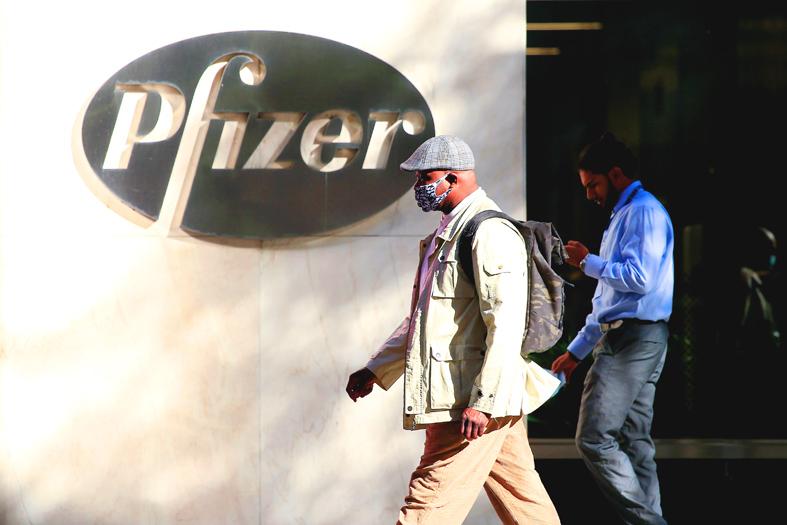Pfizer Inc CEO Albert Bourla pocketed about US$5.6 million after selling stock, the latest executive to reap the rewards of insider share transactions amid a vaccine-fueled rally for some pharmaceutical companies.
Bourla disposed of more than 130,000 shares on Monday, according to a filing with the US Securities and Exchange Commission.
Sally Susman, executive vice president and chief corporate affairs officer at Pfizer, also offloaded about US$1.8 million in stock.

Photo: AFP
Pfizer’s shares soared that day after a report on results from its experimental vaccine with partner BioNTech SE.
US National Institute of Allergy and Infectious Diseases Director Anthony Fauci called the test findings “extraordinary” and regulators on both sides of the Atlantic could clear the vaccine for emergency use imminently.
Both executives’ sales were done under prearranged 10b5-1 trading plans, which let people schedule sales in advance at certain times or prices, absolving themselves from accusations of insider trading.
Public-company executives typically receive a considerable share of their compensation in the form of stock, and the vast majority periodically sell part of their holdings.
A Pfizer spokeswoman said the sales were part of the executives’ personal financial planning.
Bourla authorized the sale in August last year and Susman in November, provided the stock reached a certain price.
Still, some governance watchdogs criticize executive sales generally, and trading plans in particular, asking why bosses would dispose of stock if they think the price might be higher in the future.
Moderna Inc, for example, has received scrutiny as executives sold large amounts of stock throughout the spring and the summer.
Moderna CEO Stephane Bancel has sold more than 500,000 shares this year, but the value of his stake has swelled as the stock has rallied more than 300 percent this year.
Moderna is also slated to release its own late-stage COVID-19 vaccine data sometime this month that could push prices higher.
Moderna did not immediately respond to e-mailed requests seeking comment.

Intel Corp chief executive officer Lip-Bu Tan (陳立武) is expected to meet with Taiwanese suppliers next month in conjunction with the opening of the Computex Taipei trade show, supply chain sources said on Monday. The visit, the first for Tan to Taiwan since assuming his new post last month, would be aimed at enhancing Intel’s ties with suppliers in Taiwan as he attempts to help turn around the struggling US chipmaker, the sources said. Tan is to hold a banquet to celebrate Intel’s 40-year presence in Taiwan before Computex opens on May 20 and invite dozens of Taiwanese suppliers to exchange views

Application-specific integrated circuit designer Faraday Technology Corp (智原) yesterday said that although revenue this quarter would decline 30 percent from last quarter, it retained its full-year forecast of revenue growth of 100 percent. The company attributed the quarterly drop to a slowdown in customers’ production of chips using Faraday’s advanced packaging technology. The company is still confident about its revenue growth this year, given its strong “design-win” — or the projects it won to help customers design their chips, Faraday president Steve Wang (王國雍) told an online earnings conference. “The design-win this year is better than we expected. We believe we will win

Quanta Computer Inc (廣達) chairman Barry Lam (林百里) is expected to share his views about the artificial intelligence (AI) industry’s prospects during his speech at the company’s 37th anniversary ceremony, as AI servers have become a new growth engine for the equipment manufacturing service provider. Lam’s speech is much anticipated, as Quanta has risen as one of the world’s major AI server suppliers. The company reported a 30 percent year-on-year growth in consolidated revenue to NT$1.41 trillion (US$43.35 billion) last year, thanks to fast-growing demand for servers, especially those with AI capabilities. The company told investors in November last year that

Power supply and electronic components maker Delta Electronics Inc (台達電) yesterday said it plans to ship its new 1 megawatt charging systems for electric trucks and buses in the first half of next year at the earliest. The new charging piles, which deliver up to 1 megawatt of charging power, are designed for heavy-duty electric vehicles, and support a maximum current of 1,500 amperes and output of 1,250 volts, Delta said in a news release. “If everything goes smoothly, we could begin shipping those new charging systems as early as in the first half of next year,” a company official said. The new